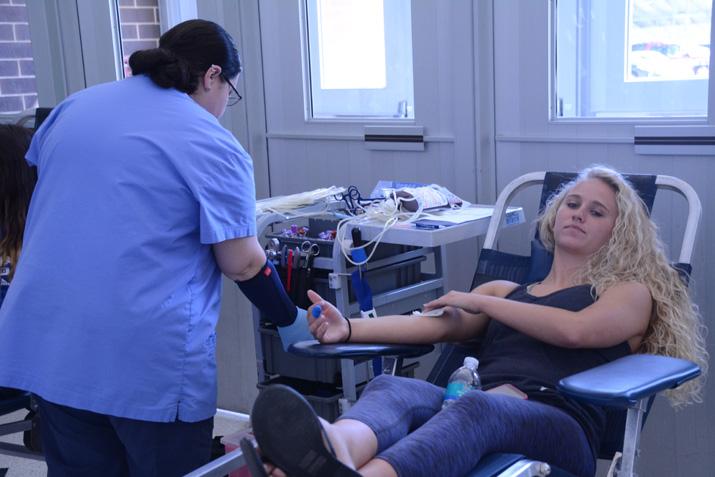Blood drive receives donated blood, turns away gay student
Senior Payton Thompson participates in the blood drive May 2015. LifeServe gives students the opportunity to donate each semester.
May 20, 2015
Every semester, Student Council puts on their blood drive. LifeServe Blood Center comes to the school and throughout one school day, students are able to make their way down to the big gym foyer, sign in and after a series of tests, donate their blood.
One part of going through the steps to be able to donate is filling out a questionnaire. It asks several questions that some might find rather personal, but it is a requirement for LifeServe to ensure they get clean blood.
Of those questions asks possible male donors if they have ever had sex with another man. If answered yes, the male is labeled a MSM (men who have sex with men) as well as “red-flagged” by LifeServe employees and told they can not donate.
Of the many students that participated in the donation, one in particular went through the experience of being “red-flagged” for his sexual history. “It’s not fair because everyone has the right to save a life,” senior Jordan Ellis said after being denied access to donating for the second time.
Ellis argued that because of the rumored change to the Food and Drug Administration (FDA) policy, which allowed MSM to donate after going a year without having sex with another male, he should have been able to donate. “Discrimination is unfair and unacceptable,” Ellis said.
After speaking with LifeServe’s public relations and marketing specialist Nicole Hanger, it was discovered that the new policy being talked about was still in discussion, and has neither been put into place or rejected. “LifeServe Blood Center believes all potential blood donors should be treated with fairness, equality and respect,” Hanger said. “Accurate donor histories and medically supported donor deferral criteria are critical to the continued safety of blood transfusion.”
There is no telling when the FDA will decide on whether to accept or deny the new policy change for MSM. As of now, all men that have had sex with another man since 1977, around the beginning of the AIDS epidemics, are unable to donate blood. “The [FDA] will take the necessary steps to recommend a change to the blood donor deferral period for men who have sex with men from indefinite deferral to one year since the last sexual contact,” the FDA said in a public statement posted on their website Dec. 23, 2014.
In the upcoming months, Ellis hopes for the policy that would allow him to donate blood to be accepted by the FDA. “It’s great we get to be a part of society,” Ellis said in reply to hearing about the possibility of the new policy being put into place.





